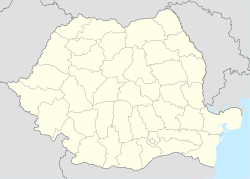Târgu Frumos
| Târgu Frumos | ||
|---|---|---|
| Town | ||
|
||
| Location of Târgu Frumos | ||
| Coordinates: 47°12′35″N 27°00′47″E / 47.20972°N 27.01306°ECoordinates: 47°12′35″N 27°00′47″E / 47.20972°N 27.01306°E | ||
| Country |
|
|
| County | Iași | |
| Status | Town | |
| Government | ||
| • Mayor | Ionel Vatamanu (Social Democratic Party) | |
| Area | ||
| • Total | 15.13 km2 (5.84 sq mi) | |
| Population (2002) | ||
| • Total | 13,619 | |
| Time zone | EET (UTC+2) | |
| • Summer (DST) | EEST (UTC+3) | |
Târgu Frumos (spelled Tîrgu Frumos during the Communist period; sometimes incorrectly spelled as Târgul / Tîrgul Frumos, Romanian pronunciation: [ˌtɨrɡu fruˈmos]) is a town in Iași County, Moldavia, Romania. As of 2004[update] it has a population of 13,619. Eleven villages were administered by the town until 2004, when they were split off to form Balș, Costești and Ion Neculce Communes.
During World War II, in March and May 1944, this area was the scene of the , part of the First Jassy-Kishinev Offensive.
According to the 1930 census, 1,608 Jews lived in Târgu Frumos. In the fall of 1940, all Jewish men, from 18 to 50 years old, were subjected to forced labor. Many were sent to the work camp Tudoreni-Rechita, situated in Botoșani County, while others were deported to Transnistria. Târgu Frumos was also a 24-hour stop of the "Death train" going to the Călărași camp. On July 1, 1941, when the train arrived in Târgu Frumos, 654 bodies were removed from the train and transported to the local Jewish cemetery where they were buried.
As of 2011, 9,386 people inhabited the town, 81.6% Romanians, 9.14% Lipovans and 9.08% Roma.
Roman Catholic Church
...
Wikipedia


